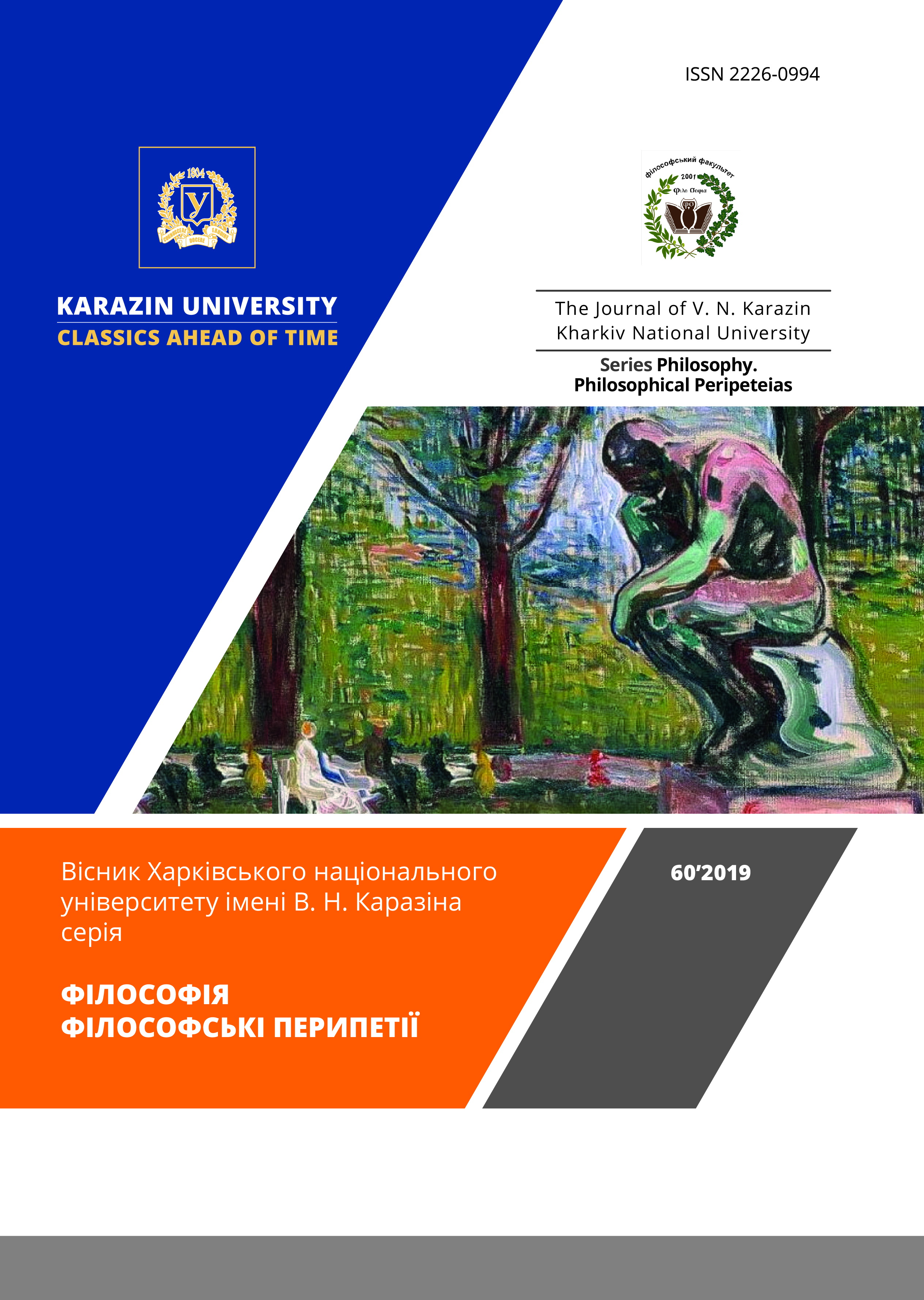ETHICAL PROBLEMS OF REALIZATION OF CALLING OF A PERSON
Abstract
The article researches ethical problems of realization of human calling. On the basis of ideas of the ethics of E. Levinas and their interpretations the author proves the importance of ethical dimension of evaluation of calling as a way of self-actualization of a personality. The purpose of the study is to determine of the conditions and requirements for understanding of calling by personality. However, from the ethical point of view those conditions and requirements appeared to be independent from the individual aims and visions of calling. Therefore, reveals itself the transcendence of the purpose of calling, devotion of a person to over-personal aims and values. The research analyzes the interrelations between the ideas of calling and mission or assignments of a man in the world. The ethical problem presents also the realization of the ethical obligations versus desires and will of calling. The article researches the problem of the purpose of life related to individual understanding of calling. The other issue of the study is the topic of a highest good as the aim and ethical dimension for calling. The theme of destiny and predestination researched as relevant for the experience of calling as well as the phenomenon of gift. Calling is a realization of given to a person and of his or her gifts. For the conclusion was determined the multidimensional character of values of human calling. In the essence of this phenomenon revealed the combination of personal and transcendent, over-personal motives. There is a hierarchy of levels of good in the experience of calling. The person must be able to build up and understand those levels by means of ethical thinking in order to realize calling in the life. There could not be an irresponsible calling of a person. It has to be a correlation of calling with responsibility to family, society and the world of higher ethical values.
Downloads
References
/References
Joldersma, C. (2014). A Levinasian Ethics for Education’s Commonplaces: Between Calling and Inspiration. New York: Palgrave MacMillan.
Levinas, E. (2000). Selected Works. Тоtality and Infinity. (N. B. Mankovskaia, Trans.). Moscow and Saint Petersburg: Universitetskaia kniga. (In Russian).
Levinas, Е. (1999). Between Us. (V. Kurynskyi, Trans.). Kyiv: Dukh i Litera; Zadruga. (In Ukrainian).
Malakhov, V. А. (2018). Nagarian Notes. Kyiv: Dmitriy Burago Publishing house. (In Russian).
Muliarchuk, Ye. (2017). Calling as a Motivating Factor of the Development of Education in Ukraine. Philosophy of Education: Research Journal, 1 (20), 213–234. (In Ukrainian).
Weber, М. (1990). Selected Works. (M. I. Levyna, A. F. Fylyppova & P. P. Haidenko, Trans.). Moscow: Progress. (In Russian).
Weber, М. (1994). The Protestant Ethic and the Spirit of Capitalism. (O. Pohorilyi, Trans.). Kyiv: Оsnovy. (Original work published 1905). (In Ukrainian).
Вебер М. Избранные произведения / пер. с нем. М. И. Левина, А. Ф. Филиппова, П. П. Гайденко. М.: Прогресс, 1990. 808 с.
Вебер М. Протестантська етика і дух капіталізму / пер. з нім. О. Погорілого. К.: Основи, 1994. 261 с.
Левинас Э. Избранное. Тотальность и бесконечное / пер. с франц. Н. Б. Маньковской М.; СПб: Университетская книга, 2000. 415 с.
Левінас Е. Між нами / пер. з франц. В. Куринського. К.: Дух і Літера; Задруга, 1999. 312 с.
Малахов В. А. Нагарийские тетради. К.: Издательский дом Дмитрия Бураго, 2018. 156 с.
Мулярчук Є. І. Покликання як мотивуючий чинник розвитку освіти в Україні. Філософія освіти. Науковий часопис. № 1 (20). Інститут вищої освіти Національної академії педагогічних наук України, Національний педагогічний університет ім. М. П. Драгоманова. Київ, 2017. С. 213–234.
Joldersma C. A Levinasian Ethics for Education’s Commonplaces: Between Calling and Inspiration. New York: Palgrave MacMillan, 2014. 126 p.
Citations
FUNCTIONS OF ARCHETYPE AS A VALUE DETERMINANT OF ACTIVITY: SOCIO-PHILOSOPHICAL ANALYSIS
(2020) The Journal of V. N. Karazin Kharkiv National University, Series "Philosophy. Philosophical Peripeteias"
Crossref
Authors who publish with this journal agree to the following terms:
- Authors retain copyright and grant the journal right of first publication of this work under the terms of a license Creative Commons Attribution License 4.0 International (CC BY 4.0).
- Authors are able to enter into separate, additional contractual arrangements for the non-exclusive distribution of the journal's published version of the work (e.g., post it to an institutional repository or publish it in a book), with an acknowledgement of its initial publication in this journal.
- Authors are permitted and encouraged to post their work online (e.g., in institutional repositories or on their website) prior to and during the submission process, as it can lead to productive exchanges, as well as earlier and greater citation of published work.






3.gif)




